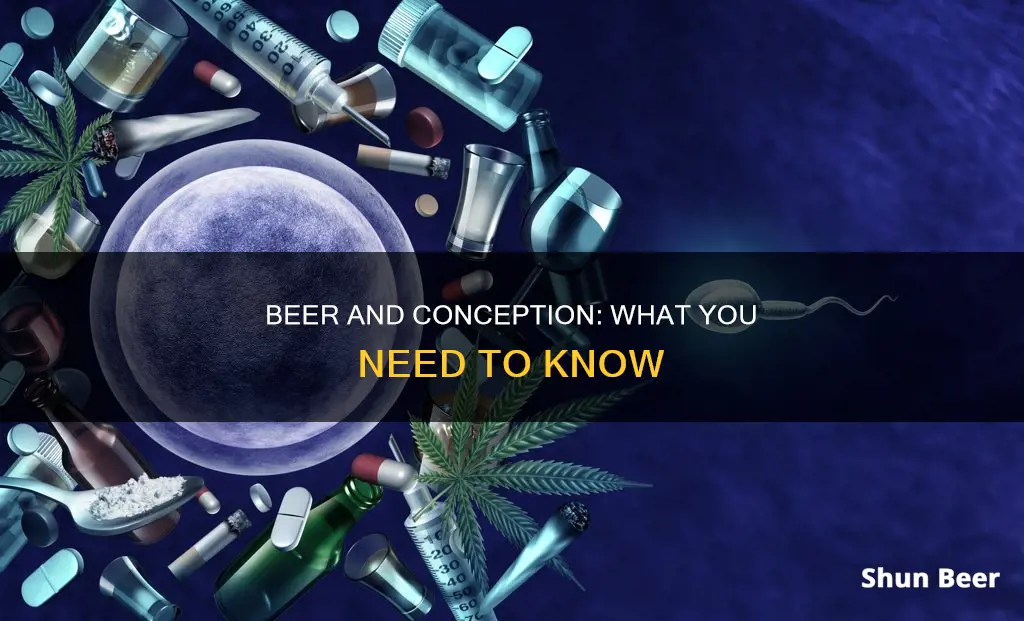
Alcohol is the most widely used recreational substance in the United States, with 86.4% of people over 18 reporting consumption at some point in their lives. If you're trying to conceive, you might be wondering if it's safe to drink alcohol. The short answer is that it's best to avoid it. Here's what you need to know about the impact of alcohol on fertility and conception.
| Characteristics | Values |
|---|---|
| Should you drink beer while trying to conceive? | No, it is not recommended to drink beer or any other alcoholic beverage while trying to conceive. |
| Why? | Alcohol can negatively impact fertility and increase the risk of early pregnancy loss. It can affect both female and male fertility, and there is no known safe level of alcohol consumption during pregnancy. |
| Effects on female fertility | Heavy drinking can cause changes in ovulation, cycle regulation, and ovarian reserve, and prevent proper implantation, leading to an increased risk of early pregnancy loss. |
| Effects on male fertility | Alcohol consumption can lead to decreased testosterone levels, reduced sperm production, and testicular atrophy in men. |
| Recommendations | It is advisable to abstain from alcohol or at least reduce consumption while trying to conceive to increase the likelihood of a successful and healthy pregnancy. |
What You'll Learn

Alcohol can harm a fertilised egg
For women, heavy drinking can cause changes in ovulation, cycle regulation, and ovarian reserve. It can also prevent proper implantation in the uterus, resulting in an increased rate of early pregnancy loss. Alcohol can disrupt normal hormone functioning and cause imbalances in reproductive hormone levels, increasing the risk of early pregnancy loss. Additionally, high oestrogen levels due to alcohol consumption can lower the chance of implantation, as a fertilised egg or developing embryo may not be able to attach itself to the uterus.
For men, heavy drinking has been shown to decrease the hormones needed for sperm production. Alcohol consumption in men can lead to reduced testosterone levels, decreased sperm count, and impaired sperm quality. Studies have found that men who consumed more than 5 units of alcohol per week experienced a decrease in sperm quality.
The negative impact of alcohol on conception and pregnancy is well-established. The NHS strongly advises against drinking alcohol when trying to conceive or during pregnancy. The safest approach is to abstain from alcohol completely to eliminate any potential risks to the developing embryo or foetus.
Gun Owners and Alcohol: Drinking and Carrying a Firearm
You may want to see also

Drinking alcohol while pregnant can cause fetal alcohol syndrome
Drinking alcohol while pregnant can have serious consequences for the baby's health and development. Alcohol consumed by a pregnant person passes directly to the baby through the placenta and the umbilical cord, and the baby is unable to process it due to their underdeveloped liver. This can lead to a range of health problems for the baby, collectively known as fetal alcohol spectrum disorders (FASDs).
FASDs can cause a wide range of issues for the baby, including physical, intellectual, and developmental disabilities. The risk of FASDs is present throughout the entire pregnancy, and there is no known safe amount or time for alcohol consumption during this period. Even drinking in the first few weeks before knowing one is pregnant can be harmful to the baby.
Problems associated with FASDs include preterm birth, low birth weight, birth defects, and miscarriage. Preterm birth can lead to serious health issues for the baby at birth and later in life. Birth defects affect the look or function of one or more body parts, including hearing loss, heart problems, and cleft lip.
FASDs can also cause intellectual and developmental disabilities, resulting in problems with learning, behaviour, communication, and managing emotions. These disabilities can have lifelong consequences, affecting the child's ability to perform daily tasks and interact socially.
To minimise any risk to the baby, it is recommended that pregnant people or those planning to become pregnant abstain from alcohol consumption. While it may be challenging to give up drinking, it is crucial to prioritise the health and well-being of the baby. Seeking support from healthcare providers or organisations dedicated to helping with alcohol reduction can be beneficial for those who need assistance in quitting.
Beer and Farxiga: What You Need to Know
You may want to see also

Alcohol negatively impacts fertility in both men and women
Alcohol negatively affects male fertility, too. Female partners of men who have a high alcohol intake are less likely to become pregnant. Drinking more than 14 units of alcohol per week (the UK low-risk drinking guideline) lowers testosterone levels and sperm quality and quantity in men. This is because alcohol abuse can lead to the destruction of sperm-producing cells in the testicles, affecting the quality of the sperm.
Excessive alcohol consumption has been shown to reduce testosterone production and even shrink the testicles, where testosterone is produced. Testosterone is directly involved in almost all parts of the male reproductive process, so a reduction in testosterone caused by alcohol can cause a range of issues, including reduced fertility and impotence.
Alcohol can also inhibit the function of the testes, stopping sperm from developing properly and reducing their ability to move towards an egg. This is because alcohol stops the liver from properly metabolising vitamin A, which is needed for sperm to develop.
In summary, alcohol can drastically reduce male and female fertility, but the effects are dose-dependent and reversible. The more a person drinks, the worse it will be for their fertility, and ceasing to drink regularly can dramatically improve their ability to conceive.
Beer and Ice Cream: A Match Made in Heaven?
You may want to see also

Alcohol can cause period problems, making it harder to conceive
Alcohol can affect the menstrual cycle, making it harder to conceive. Drinking during your period can impact hormone levels, increasing the production of estrogen and testosterone. This can exacerbate PMS symptoms, like mood swings and irritability, and worsen cramps. Regular drinking can cause hormonal fluctuations, leading to irregular ovulation and periods, and even the complete cessation of the menstrual cycle.
The body needs a proper balance of estrogen and progesterone, released in specific amounts, for ovulation and menstruation to be regular. Alcohol's effects on hormone balance can cause ovulation to become irregular or stop entirely. This can make it more difficult to conceive, as the timing of ovulation may be unpredictable.
Chronic alcohol use can lead to reproductive issues, including difficulty conceiving. Alcohol can also negatively affect fertility by disrupting hormone levels, causing irregular or absent ovulation, and altering the timing of ovulation. Overconsumption of alcohol—more than three drinks per day or more than seven to eight drinks per week—can have long-term effects on blood pressure and heart health, posing dangers during pregnancy and when trying to conceive.
Additionally, alcohol abuse can harm relationships and society through violence, crime, accidents, and drink driving. It can also increase the risk of developing several types of cancer, including breast cancer, and can cause permanent brain damage and mental health problems.
Therefore, it is recommended that women who are not using birth control and are trying to get pregnant abstain from drinking alcohol entirely.
Buspar and Beer: Is It Safe to Mix?
You may want to see also

Heavy drinking can cause erectile dysfunction in men
Drinking alcohol while trying to conceive is not recommended. Alcohol can negatively impact fertility and pose serious risks to the foetus from the moment of conception. Both men and women should avoid alcohol to increase the likelihood of a successful and healthy conception.
Hormone Levels
Alcohol is known to lower testosterone levels, which can limit nitric oxide production. Nitric oxide is the key molecule that helps the blood vessels in the penis relax, allowing for an erection.
Nervous System
Alcohol is a depressant that affects the central nervous system. Short-term alcohol consumption can slow down the transmission of information between the brain and penis, leading to decreased sensitivity. Chronic heavy drinking can cause nervous system dysfunction, with erectile dysfunction being the most common symptom.
Circulation and Blood Vessels
Alcohol is a diuretic, which means it increases urination and causes dehydration. Dehydration reduces blood volume and blood flow to the penis, making it harder to get an erection. Additionally, dehydration increases angiotensin levels, a hormone associated with erectile dysfunction. Chronic alcohol consumption can also cause permanent damage to blood vessels and nerves, further impacting circulation.
Research Findings
Several studies have found a significant relationship between regular alcohol consumption and erectile dysfunction. One study reported that 72% of male subjects with alcohol dependence experienced one or more types of sexual dysfunction, with erectile dysfunction being one of the most common issues. Another study of 104 people with alcohol use disorder and erectile dysfunction found that 88.5% showed improvements in erectile function after three months of abstaining from alcohol.
Detox and Drinking: Is Having a Beer Safe?
You may want to see also
Frequently asked questions
It is not recommended to drink beer or any other alcoholic beverage while trying to conceive, as alcohol negatively impacts fertility and increases the risk of early pregnancy loss.
Alcohol affects fertility by disrupting normal hormone functioning and causing imbalances in reproductive hormone levels. This can lead to period problems, ovulation issues, and decreased fertility rates.
Drinking alcohol while trying to conceive can increase the risk of early pregnancy loss and potentially harm the fertilized egg or developing embryo. It can also cause birth defects and increase the risk of fetal alcohol spectrum disorders.
Any amount of alcohol can pose a health risk to an unborn child, so it is recommended to avoid consuming any alcohol when trying to conceive. Heavy drinking, which is defined as more than 14 units per week, can have particularly negative impacts on fertility and pregnancy outcomes.
Instead of drinking alcohol, try mocktails, virgin mixes, or spritzers. Making lifestyle changes, such as getting regular exercise and maintaining a healthy weight, can also improve fertility and increase the chances of a successful and healthy conception.







